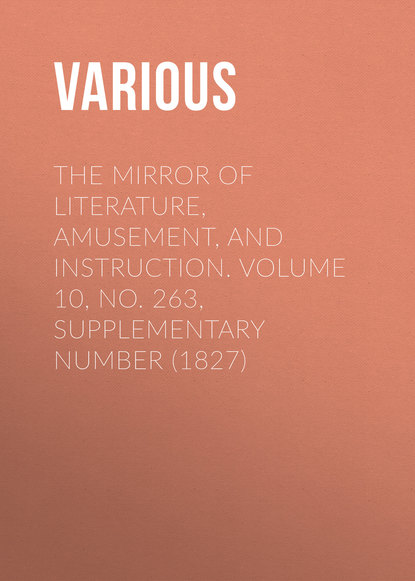 Полная версия
Полная версияThe Mirror of Literature, Amusement, and Instruction. Volume 10, No. 263, Supplementary Number (1827)
About two o'clock of the same day, the priest Vignali administered the sacrament of extreme unction. Some days before, Napoleon had explained to him the manner in which he desired his body should be laid out in state, in an apartment lighted by torches, or what Catholics call une chambre ardente. "I am neither," he said in the same phrase which we have formerly quoted, "a philosopher nor a physician. I believe in God, and am of the religion of my father. It is not everybody who can be an atheist. I was born a Catholic, and will fulfil all the duties of the Catholic church, and receive the assistance which it administers." He then turned to Dr. Antommarchi, whom he seems to have suspected of heterodoxy, which the doctor, however, disowned. "How can you carry it so far?" he said. "Can you not believe in God, whose existence every thing proclaims, and in whom the greatest minds have believed?"
As if to mark a closing point of resemblance betwixt Cromwell and Napoleon, a dreadful tempest arose on the 4th of May, which preceded the day that was to close the mortal existence of this extraordinary man. A willow, which had been the exile's favourite, and under which he had often enjoyed the fresh breeze, was torn up by the hurricane; and almost all the trees about Longwood shared the same fate.
The 5th of May came amid wind and rain. Napoleon's passing spirit was deliriously engaged in a strife more terrible than that of the elements around. The words "tête d'armée" the last which escaped his lips, intimated that his thoughts were watching the current of a heady fight. About eleven minutes before six in the evening, Napoleon, after a struggle which indicated the original strength of his constitution, breathed his last.
HIS FUNERAL
Bonaparte was buried on the 8th of May, in a small secluded recess called Slane's, or Haine's Valley, where a fountain arose, at which his Chinese domestics used to fill the silver pitchers, which they carried to Longwood for Napoleon's use. "All the troops were under arms upon the solemn occasion. As the road did not permit a near approach of the hearse to the place of sepulture, a party of British grenadiers had the honour to bear the coffin to the grave. The prayers were recited by the priest, Abbé Vignali. Minute guns were fired from the admiral's ship. The coffin was then let down into the grave, under a discharge of three successive volleys of artillery, fifteen pieces of cannon firing fifteen guns each. A large stone was then lowered down on the grave, and covered the moderate space now sufficient for the man for whom Europe was once too little."
A lady of high rank, who happened to live for some time in the same convent at Paris, where Josephine was also a pensioner or boarder, heard her mention the prophecy, and told it herself to the author, just about the time of the Italian expedition, when Bonaparte was beginning to attract notice. Another clause is usually added to the prediction—that the party whom it concerned should die in an hospital, which was afterwards explained as referring to Malmaison. This the author did not hear from the same authority. The lady mentioned used to speak in the highest terms of the simple manners and great kindness of Madame Beauharnois.
1
It did not escape the minute observers of this scene, that he still held in his hand the bag which had contained the fatal pistol, and which was inscribed with the words, Au grand monarque, alluding to the sign, doubtless, of the gunsmith who sold the weapon, but singularly applicable to the high pretensions of the purchaser.
2
The fate of no tyrant in history was so hideous at the conclusion, excepting perhaps that of Jugurtha.
3
Benson's "Sketches of Corsica," p. 4.
4
"Sketches of Corsica," p. 4.
5
The mother of Letitia Ramolini, wife of Carlo Bonaparte, married a Swiss officer in the French service, named Fesch, after the death of Letitia's father.
6
They were many years since communicated to the author by Messrs. Joseph and Louis Law, brothers of General Baron Lauriston, Bonaparte's favourite aid-de-camp. These gentlemen, or at least Joseph, were educated at Brienne, but at a later period than Napoleon. Their distinguished brother was his contemporary.
7
Benson's "Sketches of Corsica," p. 121.
8
Not literally, however: for it is worth mentioning, that when he was in full-blown possession of his power, an inheritance fell to the family, situated near Ajaccio, and was divided amongst them. The first consul, or emperor, received an olive-garden as his share.—Sketches of Corsica.
9
Bonaparte was then in his twenty-sixth year. Josephine gave herself in the marriage contract for twenty-eight.
10
A lady of high rank, who happened to live for some time in the same convent at Paris, where Josephine was also a pensioner or boarder, heard her mention the prophecy, and told it herself to the author, just about the time of the Italian expedition, when Bonaparte was beginning to attract notice. Another clause is usually added to the prediction—that the party whom it concerned should die in an hospital, which was afterwards explained as referring to Malmaison. This the author did not hear from the same authority. The lady mentioned used to speak in the highest terms of the simple manners and great kindness of Madame Beauharnois.



